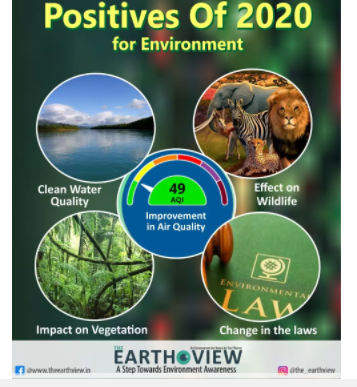COVID-19 is not an unknown word for 2020. Lockdowns have redefined the way life has been for people around the globe. Coronavirus pandemic has affected economies and severely hit the world. It has been an enormous loss to humanity in over a decade. Fewer activities result in no jobs and eventually a lot more issues than just fighting the life taking virus. Although the world was busy fighting and adjusting the new normal in this utter chaos, it gave the environment time to breathe and take a break. Reduced traffic on the road and cut down in pollution emitted by factories has encouraged changes, something the environmentalist activists were trying to achieve.
REDUCTION IN AIR POLLUTION: A drop of 25% in carbon dioxide and 40% in nitrogen oxide emissions were observed. Similar changes have been observed in Italy during the self-isolation period. Energy-related CO2 emissions in India are on track with value 1.8 as per SDG report 2020 (Sustainable development goals, 2020). Decreased activities in the lockdown likely gave a reset button to the planet to heal itself.
UN General assembly’s seventeen sustainable development goals include clean air, water, good health, and other responsible production. Because of the situations created and demand, COVID-19 became the reason to flatten the curve, bringing down global air pollution with over 50% of reduced carbon monoxide. Restrictions being implemented and going out being limited. Quarantine has positive effects on reducing the carbon footprints and industrial heating decline.
REDUCTION IN WATER POLLUTION: With the effect of the limitations, industries had reduced activities. Adding to people refrained from travelling the tourism industry was also on halt, which resulted in less population on the beach and other places and reduction in utilisation of water by clubs and hotels. Since about 60 to 70 per cent of water use is by the agricultural industry, we expect it that water consumption will decrease if the consumption of our natural resources will decrease.
As many industries have reduced activities, the industry sector’s water consumption, which is about 20 to 30 per cent of the total, should also decrease. The smallest portion of water consumption is by human activity. Likely, this will also decrease, as homebound people are more efficient in the water when consumed at home. Showers at home are usually shorter than those at hotels or health clubs. Overall, we should see a decrease in water consumption worldwide. (Nassos, 2020)
FLORA AND FAUNA FOUND ITS WAY TO FLOURISH: While humans were under lockdown in their homes, we saw animals on roads claiming their territory back. News on birds and animals that flooded the social media were delighted. While the home confinement rules/lockdown and social distancing have stopped the movement of peoples outside, this global lockdown has allowed birds and wildlife to flourish and enjoy all the freedom of nature. Reports confirm that a growing flock of thousands of flamingos beating their black and pink-lined wings has been seen splashing over the glistening water of Nartan Lagoon, of the Adriatic coast.
According to park authorities, since January 2020, the number of these birds has increased by 3-fold up to some 3,000. Similarly, the wildlife seems to have regained all their absolute rights and enjoyed the freedom of nature (Agence France–Presse). We similarly found increased wildlife activities in the Indian beaches, with flocks of flamingos flying to these beaches, with the number increasing by over 25% compared with previous years. (Frontiers in public health, 2020) With less activity and a decline in pollution, it does not pollute the amount of oxygen and other nutrients needed for growth, allowing plants to grow and improve the food cycle’s quality.
DECLINE IN FISHING FOR MARINE LIFE: Marine life is affected by excessive demands, and the pollution created by humans reaching the water bodies. 2020 is the year of human activity restrictions for the novel coronavirus pandemic, which positively impacts marine life. Since March 11, when the World Health Organization declared COVID-19 a pandemic, global fishing activity has been down by nearly 10% compared to the 2018-2019 average, according to a new estimate. In some places, the decline has been much more significant. (Sustainable development goals, 2020)
In conclusion, 2020 has been a challenging year. It gave a reality check to humankind and further set an example of how we can work on the environment to achieve a sustainable future by limiting our needs and giving the planet time to heal. The effects on the environment seen are temporary. If we don’t take strict action to reflect on our natural resources and be responsible for our waste production, we might have an uncertain future with less time to work.
By the end of 2020, it looks as if nature wanted the human tribe to realise their folly and atrocities on the environment and brought in COVID-19 to put a pause. Let us be mindful of all that we do to the environment and take this new normal of living as a lesson for the generations to come.

